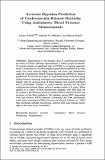Accurate Bayesian prediction of cardiovascular-related mortality using ambulatory blood pressure measurements
Date
2017-05-30Author
O'Neill, James
Madden, Michael G.
Dolan, Eamon
Metadata
Show full item recordUsage
This item's downloads: 307 (view details)
Cited 0 times in Scopus (view citations)
Recommended Citation
O’Neill J., Madden M.G., Dolan E. (2017) Accurate Bayesian Prediction of Cardiovascular-Related Mortality Using Ambulatory Blood Pressure Measurements. In: ten Teije A., Popow C., Holmes J., Sacchi L. (eds) Artificial Intelligence in Medicine. AIME 2017. Lecture Notes in Computer Science, vol 10259. Springer, Cham
Published Version
Abstract
Hypertension is the leading cause of cardiovascular-related
mortality (CVRM), affecting approximately 1 billion people worldwide.
To enable patients at significant risk of CVRM to be treated appropriately,
it is essential to correctly diagnose hypertensive patients at an early
stage. Our work achieves highly accurate risk scores and classification
using 24-h Ambulatory Blood Pressure Monitoring (ABPM) to improve
predictions. It involves two stages: (1) time series feature extraction using
sliding window clustering techniques and transformations on raw ABPM
signals, and (2) incorporation of these features and patient attributes
into a probabilistic classifier to predict whether patients will die from
cardiovascular-related illness within a median period of 8 years. When
applied to a cohort of 5644 hypertensive patients, with 20% held out
for testing, a K2 Bayesian network classifier (BNC) achieves 89.67% test
accuracy on the final evaluation. We evaluate various BNC approaches
with and without ABPM features, concluding that best performance
arises from combining APBM features and clinical features in a BNC
that represents multiple interactions, learned with some human knowledge
in the form of arc constraints.


